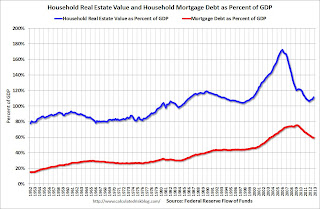According to the Fed, household net worth increased in Q4 compared to Q3 2012, and is up 9% from Q4 2011. Net worth peaked at $67.4 trillion in Q3 2007, and then net worth fell to $51.4 trillion in Q1 2009 (a loss of $16 trillion). Household net worth was at $66.1 trillion in Q4 2012 (up $14.7 trillion from the trough, but still down $1.3 trillion from the peak).
The Fed estimated that the value of household real estate increased $447 billion to $17.6 trillion in Q4 2012. The value of household real estate is still $5.0 trillion below the peak.
 Click on graph for larger image.
Click on graph for larger image.This is the Households and Nonprofit net worth as a percent of GDP.
This includes real estate and financial assets (stocks, bonds, pension reserves, deposits, etc) net of liabilities (mostly mortgages). Note that this does NOT include public debt obligations.
This ratio was relatively stable (or increasing gradually) for almost 50 years, and then we saw the stock market and housing bubbles. The ratio has been trending up and increased again in Q4.
 This graph shows homeowner percent equity since 1952.
This graph shows homeowner percent equity since 1952. Household percent equity (as measured by the Fed) collapsed when house prices fell sharply in 2007 and 2008.
In Q4 2012, household percent equity (of household real estate) was at 46.6% - up from Q3, and the highest since Q1 2008. This was because of both an increase in house prices in Q4 (the Fed uses CoreLogic) and a reduction in mortgage debt.
Note: about 30.3% of owner occupied households had no mortgage debt as of April 2010. So the approximately 52+ million households with mortgages have far less than 46.6% equity - and millions have negative equity.
 The third graph shows household real estate assets and mortgage debt as a percent of GDP.
The third graph shows household real estate assets and mortgage debt as a percent of GDP. Mortgage debt declined by $6 billion in Q4. Mortgage debt has now declined by $1.2 trillion from the peak. Studies suggest most of the decline in debt has been because of foreclosures (or short sales), but some of the decline is from homeowners paying down debt (sometimes so they can refinance at better rates). It appears the rate of decline is slowing.
The value of real estate, as a percent of GDP, was up in Q4 (as house prices increased), but is just above the lows of the last 30 years. However household mortgage debt, as a percent of GDP, is still historically very high, suggesting still more deleveraging ahead for certain households.